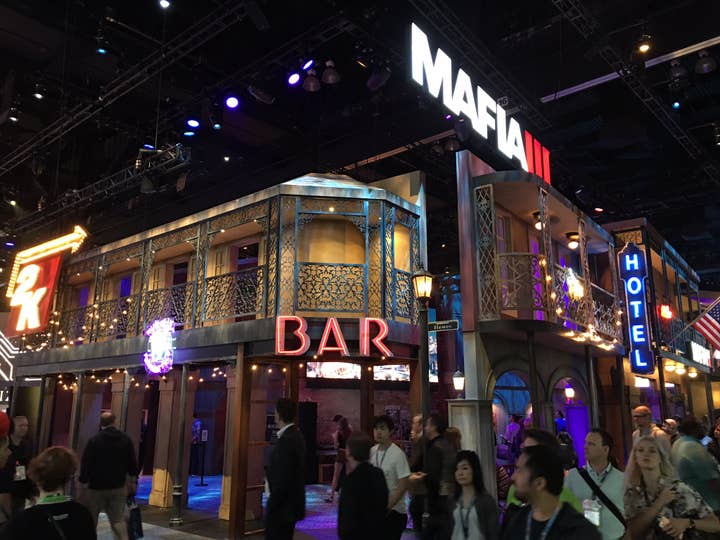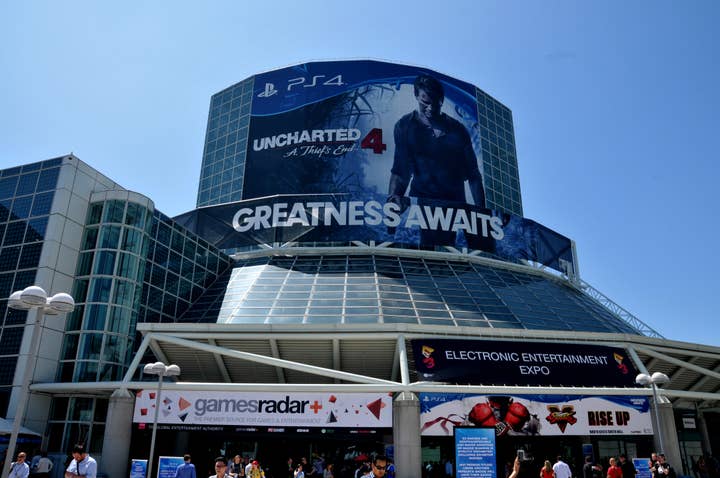E3 may need to change but it's still very relevant, say publishers
EA, Ubisoft and Take-Two executives explain why E3 matters
In the months leading up to this year's E3 Expo, notable companies like Electronic Arts, Activision Blizzard, Disney and Wargaming pulled out of the show. Disney, of course, then went on to pull out of console publishing entirely, so its decision made perfect sense in hindsight, but when the two biggest publishers in the world don't have booths on the show floor, eyebrows inevitably will be raised. While our own Rob Fahey noted that E3 is struggling to "find its purpose," the AAA publishers we chatted with this week believe that E3 is serving a purpose for the industry quite well.
Even EA, which decided to host its own EA Play show across the street at LA Live, believes in the importance of E3. Laura Miele, EA's newly promoted head of global publishing, told us that the major reason EA decided to host EA Play instead of building a booth in the convention center is that it better fits the "player first" mentality that Andrew Wilson has stressed since becoming CEO almost three years ago.
"I've been at EA for 20 years and in this role for a couple months," she told me. "I've seen a lot of change in the industry and a lot of change in the company, and I don't think I've ever felt such a tangible culture change in our company as I have around being a 'player first' company.
"I do love an event where the industry comes together and I think there's a lot of good to come from that still"
Laura Miele, EA
"Having EA Play, clearly we're inviting players and they're here to enjoy our content. We perceive it to be pretty complementary to E3; we're right next door, we're collaborating with them. We have our business meetings over there still and we have our retail partners here, our press partners, our analysts and our players in a place and in a way that we can curate the experience.
"Every single person here is registered and hand chosen by us...and it's an experience that we felt like we had more control over. Early feedback is very positive for us, but we'll leave here and we'll evaluate if this worked for us or not... And again, it's nothing that's anti-E3, [but] we're hoping the industry will shift towards players. This is where everything begins and ends for all of us."
Even if EA continues to hold its own satellite event next door rather than using a booth on the E3 show floor, Miele likes that everyone in the business comes together during the week. "I do love an event where the industry comes together and I think there's a lot of good to come from that still... I've gone to all the press conferences, we spend time with our partners and it's a great time. It's a great week for us, and it's also been a great forcing function for us as a company to get our messaging and get our games and have a moment in time where we have everything fully together as we go to market. It's a valuable milestone and deadline for us."
Ubisoft's Alain Corre, executive director of EMEA, agreed that the industry benefits from having a large gathering at one time. "I think E3 in general is a great rendezvous for this industry, because everybody has that on their agenda, and we know that there will be a lot of news announced and we know that the fans are really [prepared] to watch on any of the sites and even to come here. We need to excite this industry," he said.
"We...[have] been able to increase the size of our industry in the last 20 to 25 years, and it's because of this big moment where everyone's trying to do better and to bring something astonishing [to players]. And also for the development teams, they [try] to push themselves beyond the limit, to be able to show their new creations at E3. For us, it's a very, very good moment, and when we look at the [reception] to our press conference, we are really happy that we have this possibility to express ourselves."
"Maybe we have to adapt to the new paradigm today where the fans are omnipresent and everyone's working to make the fans happy"
Alain Corre, Ubisoft
While Ubisoft is very happy with having a large booth at E3 itself, Corre acknowledged that work needs to be done to include more players. The "player first" mentality that EA's Miele stressed is something that must be a part of the strategic thinking behind E3 in future. "So E3 maybe has to be reinvented," Corre said, "but what we're thinking is that this moment really has to be preserved, maybe slightly differently. Maybe we have to adapt to the new paradigm today where the fans are omnipresent and everyone's working to make the fans happy. Maybe we need to make it [easier] for more fans to play our products."
Corre added that his company has held Uplay events for four years, where 700 people play games and talk directly with game developers. Ultimately for E3, "reorienting around the fans I think is a good message, a good way to go, but the feeling is that we need to keep a big moment, a yearly rendezvous for this industry to go on surprising the press and everyone attached to games."
Take-Two CEO Strauss Zelnick also maintained that E3 is "the premiere video game event," but he understands why the competition might do things differently in a given year. "In a year where we have a lot to show off it's good to do it all in one place... And it's nice to be in a place where retailers are, the press, and 'prosumers' if you will. We think it's a great opportunity. We always get a lot of press out of it, [but] there have been years where we didn't have that much to talk about and we chose not to come. And so if one doesn't have that much to talk about it's understandable why you wouldn't want to invest."
Large booths at E3 can be extremely expensive - we've heard that some can exceed $1 million - and the Mafia III booth that Take-Two paid for is genuinely impressive, on the outside and inside. We posted a picture of the booth, designed to emulate a 1960's New Orleans bar (with a live Jazz band, to boot), on the GI.biz Twitter account simply because it looked cool. "On that basis alone, it's worth doing," Zelnick said. "It's not a screaming bargain, but it's worth doing."

For Zelnick, the influence of the press is still very valuable, even in an era where publishers have direct-to-consumer avenues. Not only that, but even with the rise of digital, retail still plays a big role.
"Yes, the world is changing, but we still rely on press and advertising to reach our consumers. The fact that we distribute digitally, which we do through storefronts, largely not through our own... we still have a retailer in between us and our customer. I don't think the fact that digital distribution is growing makes your job less relevant or less important or makes a conference like this less relevant or important.
"I think when E3 was really a retail conference was when you couldn't afford a sales team, but those days are long gone. We all have retail sales teams and we're visiting with the GameStops of the world year-round. They all knew our line-up well before this show. So it's great to have an opportunity to meet with them, but what really is happening is when we get back, our barometer of success is Alan [in PR] and his colleagues are going to send me notes saying we got this many press mentions... I think when you add an editorial view, what the key publications say and feel and write is really important. It is an influencer. The only other entertainment business I know of where what the press does is as important is legitimate theater. It's really important in video games, much less so in movies. You may see a Rotten Tomatoes score but unless it's really, really terrible it won't affect your choice."
We will be bringing you much more from our interviews with EA's Laura Miele, Ubisoft's Alain Corre and Take-Two's Strauss Zelnick soon. Stay tuned.
Clarification: The ESA asked that we mention that Activision and EA are "very much here, on our exhibitor list, have meeting space, and Activision even has a presence on the floor (in Sony's booth)."

